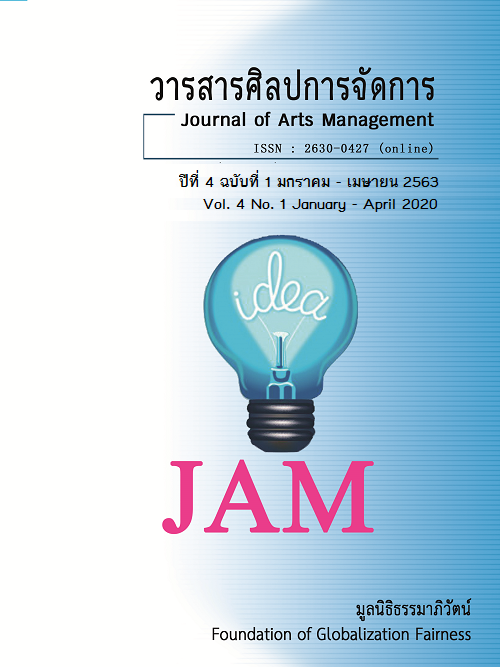The Investigation of Working Memory Imfluencing on Mathematics Achievement
Main Article Content
Abstract
The purpose of this research was to investigate the working memory influencing mathematics achievement. Using research model to be quantitative research to present like description, to use conceptual based on Neuroscience to be theory basically, to prepare learning class for being research framework. Population were the secondary students in level mathayom 3 of Primary Educational Service Area 32, semester 2560 totally 10,292 students, sample group tatally 1,504 students. to select classify by dividing to be size of schools; small, medium, large and extra size; there were 2 tools were 1) using software like measuring abilities as constructivism with attention and memory to work a while. 2) Mathematics achievement Test to be examined by experts follow to criterion, analyze data by statistics basically, mean, standard deviation, relative Variation, minimum, maximum, and correlation coefficient. The Investigation of Working Memory Influencing on Mathematics by using Multiple Regression Analysis
The results of research were found that the memory during work could predict Mathematics achievement to be at 97 percentiles and there were forecasting by raw score and standard score. The sample to be 1,504 students in Grade 9. The tool includes (1) Cognitive Ability Test Software: Attention and Working Memory (2) Mathematics Achievement Test. Multiple linear regression analysis was used to analyze data.
The raw score equation
Y = 0.094 + 0.258 (BWMA) + 0.250 (SWMA) + 0.247 (UWMA) + 0.246 (IWMA)
The standard score equation
Y/ = 0.291 (BWMA) + 0.331 (SWMA) + 0.297 (UWMA) + 0.289 (IWMA)
Article Details
Views and opinions appearing in articles in the Journal of Arts of Management It is the responsibility of the author of the article. and does not constitute the view and responsibility of the editorial team I agree that the article is copyright of the Arts and Management Journal.
References
กระทรวงศึกษาธิการ. (2555). การวัดผลประเมินผลคณิตศาสตร์. กรุงเทพฯ: บริษัท ซีเอ็ดยูเคชั่น จำกัด (มหาชน).
กระทรวงศึกษาธิการ. (2560). นโยบาย ปีงบประมาณ พ.ศ. 2560 สำนักงานคณะกรรมการการศึกษาขั้นพื้นฐาน. กรุงเทพฯ: สำนักงานคณะกรรมการการศึกษาขั้นพื้นฐาน.
กลุ่มสารสนเทศสำนักงานคณะกรรมการการศึกษาขั้นพื้นฐาน. (2560). ข้อมูลนักเรียนปีการศึกษา 2560. ค้นเมื่อ 25 กรกฎาคม 2561, จาก http://data.bopp-obec.info/emis/schooldata-view_student_area.php? Area_CODE=101732.
ทัศนีย์ บุญเติม และคณะ. (2557). การพัฒนาเครื่องมือวัดทางพุทธิปัญญา (ฉบับภาษาไทย). กรุงเทพฯ: สำนักงานคณะกรรมการวิจัยแห่งชาติ.
วัชราภรณ์ เกียรติบุญญาฤทธิ์. (2549). การวิเคราะห์ตัวแปรพหุระดับของความต้องการจำเป็นของนักเรียนและครูที่มีอิทธิพลต่อผลสัมฤทธิ์ทางการเรียนคณิตศาสตร์ของนักเรียนระดับมัธยมศึกษาตอนต้น. (วิทยานิพนธ์ครุศาสตรมหาบัณฑิต การวัดและประเมินผลการศึกษา). จุฬาลงกรณ์มหาวิทยาลัย, กรุงเทพฯ.
ศานิตย์ ศรีคุณ, อิสรานุวัฒน์ ศรีคุณ และ นายอนุชิต กุระจินดา. (2561). การพัฒนาซอฟแวร์แบบวัดความสามารถเชิงพุทธิปัญญา: ความตั้งใจและความจำขณะทำงาน. พะเยา: มหาวิทยาลัยพะเยา.
ศานิตย์ ศรีคุณ. (2560). การตรวจสอบความตรงเชิงทฤษฎีของแบบวัดจริยธรรมในกระบวนการวิจัย. วารสารศึกษาศาสตร์ มหาวิทยาลัยขอนแก่น, 40(4), 47-58.
ศานิตย์ ศรีคุณ และทัศนีย์ บุญเติม. (2559). ผลการใช้รูปแบบการเรียนการสอนที่ใช้วิจัยเป็นฐานผสานกับแนวคิดประสาทวิทยศึกษาศาสตร์ที่มีต่อผลสัมฤทธิ์ทางการเรียน ความตั้งใจ และความจำขณะทำงาน. วารสารประสาทวิทยาศาสตร์ ภาคตะวันออกเฉียงเหนือ, 11(1), 1-20.
Baddeley, A. (2010). Working memory: theories, models, and controversies. Annual Review of Psychology, 63, 1–29.
Brown, D.R. (2018). Neuroscience of Mathematical Cognitive Development: From Infancy Through Emerging Adulthood. United State: Springer International Publishing AG.
Feiler, J. B., & Stabio, M. E. (2018). Three Pillars of Educational Neuroscience from Three Decades of Literature. Trends in Neuroscience and Education, 13, 17-25.
Kline, R. B. (2016). Principles and Practice of Structural Equation Modeling. 4th ed. NY: Guilford Publications.
Srikoon, S., Bunterm, T., Nethanomsak, T., & Ngang, T. K. (2017). A Comparative Study of the Effects of the Neurocognitive-based Model and the Conventional Model on Learner Attention, Working Memory and Mood. Malaysian Journal of Learning and Instruction, 14(1), 83-110.
Srikoon, S., Bunterm, T., & Wantong, K. (2012). Factors Influencing Science Achievements. Journal of Education Khon Kaen University. 35(2), 103-108.


